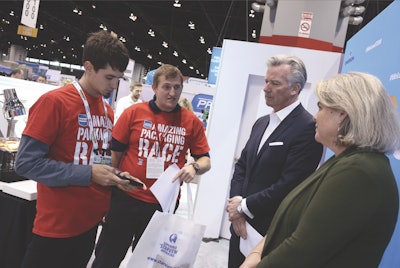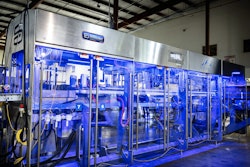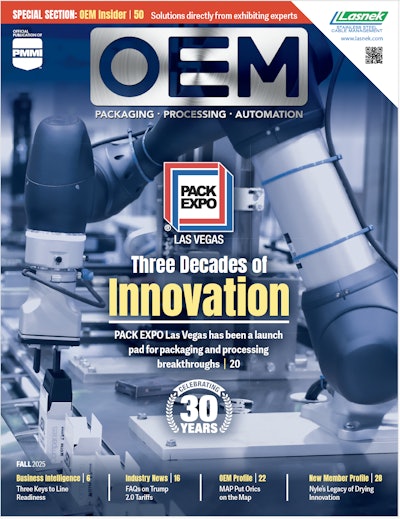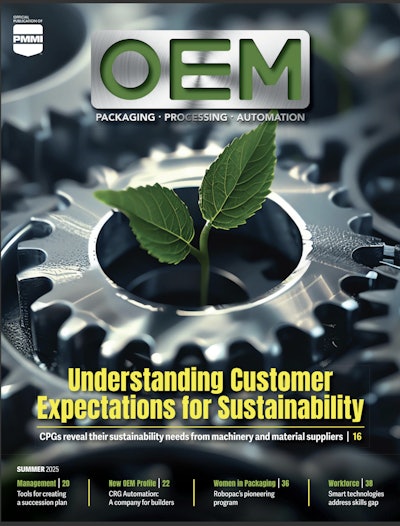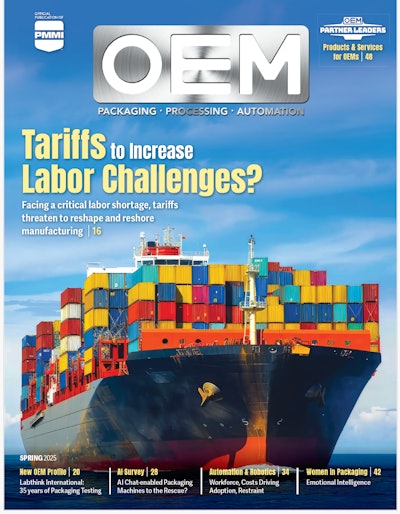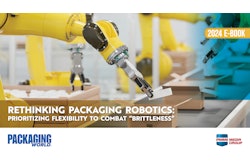Riley Morgan is a hard-working, respectful 17-year-old from Georgia who likes cars, outdoor sports and video games. He’s a typical teenager in many ways, except for a special skillset that sets him apart from most of the 65 million others who make up Generation Z—also known as the iGeneration (iGen). A senior in high school, he is a mechatronics major and he is OSHA certified, making him a coveted job candidate in the manufacturing industry.
Indeed, Morgan is a rare find—a young mind on a mission to move into manufacturing as a career. His goal is to be hired by the Kia Motors Manufacturing Georgia team. But he didn’t come to that conclusion on his own, he readily admits. Rather, it was just a few years ago, when he entered the mechatronics program at THINC College and Career Academy, a charter school in LeGrange, Georgia, that his life changed.
“I had no idea what manufacturing was before I entered ninth grade,” he says, referring to his transition from his traditional high school to THINC Academy. “In eighth grade, I was focused on video game designs, but as soon as I got to [this] high school, I realized it probably wasn’t for me.” The THINC program saved him time, money and effort, he says. “Without THINC I would have gone to college for video design and would have found out it’s not for me. Instead, I found what I enjoy doing, which is engineering, robotics and focusing on mechanical and electrical, as well as gears and conveyors, all of the different systems that make a machine move.”
It’s this THINC experience that opened his eyes to the opportunities in manufacturing. But it was his role model—his grandfather, who spent a career in the automotive industry—who influenced Morgan at an early age with stories of work while allowing his grandson to tinker with tools. He didn’t fully understand that his grandfather was talking about manufacturing at the time. THINC helped him put the pieces together, plus connected him with local manufacturers, which has positioned him for a lucrative future in this field.
The good news for Morgan is that he will never have to worry about finding work, as there’s an estimated 3.4 million manufacturing jobs that will become available in the next 10 years. But, that’s the bad news for the manufacturing industries—including processing and packaging—which are embarking upon a massive cross functional recruiting effort that involves companies, colleges, associations, apprenticeships and even parents. The goal is to attract the attention of the iGens early, bring them inhouse to train them, and, perhaps most importantly, engage them so that they stay at the company for the long term.
You better THINC about your future workforce
THINC College & Career Academy launched four years ago with a model that is based on the belief that a student’s career development is influenced by early exposure and through relationships with professionals in the field. Working directly with local manufacturers, like Kia Motors, the charter school helps employers develop internships for high school students which includes mentoring, interview assistance and support during the internship.
The school offers five career pathways connected to the high-demand jobs of the future, including mechatronics, engineering, health sciences, energy systems and business and marketing. THINC accepts students into its programs in the 9th grade and each pathway program is three semesters, allowing students to take multiple pathways over four years, or return to their traditional high school.
While students get hands-on training with PLCs and robotics, for example, they are also being groomed for the working environment. To that end, THINC CEO Kathy Carlisle says a big part of the success of the program is its emphasis on the “soft skills.” The academic team feels it is just as essential to understand the mechanics of life, including: attendance, teamwork, problem solving, initiative, productivity, communication, cooperation, respect, appearance, attitude, sense of urgency, adaptability and attention to detail.
The students are graded on their ability to master these qualities as part of the curriculum. “We hear from employers that they can teach people, but they can’t keep people or they can’t get them to work on a team or they can’t communicate” Carlisle, says. “So our students are graded on these soft skills every week, which is a huge aspect of the program.”
Morgan wasn’t too keen on this part of the schooling, he admits. But now, as a senior, he understands the value of knowing the meaning of attendance and attire, for example. “When I first came here I was iffy about it, but I realized this would get me prepared for work and even college. Knowing how to dress, knowing I need to be in class or get to work on time, and knowing how to talk to people and having a strong work ethic is great knowledge to have at a young age.”
Indeed it is, as you never get a second chance to make a first impression. Manufacturers are realizing that mantra applies not just to individuals, but to the entire industry, which is why there is a movement underway to change the reputation of manufacturing in order to make a better first impression on the next generation.
Mind the gap
At Massman Automation Designs, a packaging OEM in growth mode, the current job openings listed on the employment opportunity page range from application engineers, pneumatic assemblers, electrical controls operators, field service technicians, and more. The company has been lucky in that it has great community recognition, and, as a result, they’ve had success with recruiting efforts, which includes offering existing employees referral bonuses. People want their friends and family to work here because there are a variety of great benefits, including a wellness program, flexible schedules and mentorship programs. Still, the company feels the pressure of a dwindling talent pool.
“In any skilled labor position it is now difficult, but especially in manufacturing as kids don’t generally come out of high school saying I want to be a machinist,” says Massman human resource manager Lisa Guzek. “And parents and school counselors direct them toward a four-year degree.”
According to Guzek, there’s just not enough information out there to pull parents in and educate them on skilled labor positions. “This is a huge gap that we as manufacturers need to do a better job [of filling] by partnering with schools and getting parents in the door to show them what we have to offer,” Guzek says. “Manufacturing is more technical these days. It is not dirty and there’s not a lot of heavy-lifting. It’s a good, clean job with good pay and good benefits. And it’s a skill to take pride in.”
That’s the message that reverberated through the halls at the recent PACK EXPO International and Healthcare Packing EXPO in Chicago, where show producer, PMMI, the Association for Packaging and Processing Technologies, coordinated multiple efforts that directly interacted with high school and college students. The Future Innovators Robotics Showcase brought in eight robotics teams sponsored by PMMI member companies, one of which was Massman. The member companies provided financial help to teams in the form of equipment, tools and experts, and funds were matched by PMMI by up to $2,000 for each team.
The teams were also given a tour of the show floor, showing them the practical application for robots in the industry and offering appointments with exhibitors to provide an interactive experience for students to ask questions.
Also at the show was the Amazing Packaging Race. Sponsored by Emerson, the race brought together 20 teams from colleges across the country to complete a series of challenges over 1.2 million net-square-feet of exhibit space. Now a key program at the show, companies and colleges look forward to this event as it allows hands-on experience in a friendly competition. This year, each member of the winning team took home $500 in prize money.
Another effort, CareerLink at PACK EXPO, gave student the opportunity to have one-on-one interviews with PMMI members and CPG companies. “The idea is to get college students starting a career or veterans transitioning from the military to the private sector, to get interviews and hopefully get a job,” explains Stephan Girard, director of education and workforce development at PMMI.
The job candidates came from the recently launched CareerLink job board, providing employers with a way to identify entry-level talent.
Packaging OEM ProMach participated in the CareerLink at PACK EXPO interviews. The company started by posting internship positions on the CareerLink website so that students were able to send resumes and set up interviews ahead of time. Each candidate was given a 15-minute interview that served as the foundation for a second conversation, if applicable. In fact, the show was the perfect backdrop for on-the-spot follow-up, as students that were a good fit were invited back the next day to visit the ProMach booth and meet with managers.
ProMach had three positions open—a mechanical, electrical and industrial engineer—and ended up with three excellent internship candidates, notes Krista Combs, ProMach’s vice president of human resources who also serves on the PMMI Education Committee.
CareerLink is a platform for PMMI member companies to post entry level and internship positions and connect with students across the country looking to gain experience and employment in the packaging and processing industry. For more information go to: oemgo.to/careerlink
The PACK EXPO student programs are a result of the efforts of the PMMI Education Committee, which is on a mission to “drum up excitement for the next generation around the idea of working in the packaging industry,” says Combs. And that starts way before high school, she says, so the group is figuring out how to capture the attention of kids in elementary school. To do that, there could be partnerships with organizations that are creating “kids trade shows,” such as science technology engineering and math (STEM) fairs and robotics competitions. Combs also participated in a PMMI produced video showing industry leaders discussing the exciting opportunities in packaging, which will be sent to schools across the country.
These projects that bring industry leaders together with kids is important, as it adds a visual dimension to what has been an invisible industry.
“Kids can’t be what they don’t see,” PMMI’s Girard says. “Growing up they see police officers, and lawyers, but no one sees people in a factory or high-tech manufacturing environment. It’s that building they drive by everyday but have no idea what goes on in there. The challenge here is raising awareness.”
Girard brought the concept home during yet another PACK EXPO International program called Students PACK the EXPO, in which five Indiana high schools, including 97 students, 10 chaperones and faculty from Purdue University Northwest (PNW), were transported to the show to have lunch, hear from industry experts and to see the innovations exhibited.
Girard spoke to the students at lunch with a presentation that positions packaging as “cool.” Now, how did he do that, you ask? “I said, packaging is the biggest industry people don’t think about, and I showed them pictures of Beats headphones, Xbox, Amazon boxes and grocery store aisles where everything is packaged.”
The students toured the show floor to see the equipment that makes the cereal and mac and cheese boxes. That piqued their interest, which was apparent in the types of questions the kids asked at lunch, such as, “What do I need to do to get a job like this?” And, “how much money will I make if I do this?”
The idea for Students PACK the EXPO originated from the PMMI Education Committee which then leveraged work being done between Nick Wilson, president of Morrison Container Handling Solutions and Niaz Latif, the dean of the college of technology and executive director of the commercialization and manufacturing excellence center at PNW. The corporate and academic partnership is focused on developing a career pathway for students in high school that can lead them to a role in manufacturing. In this instance, what started with an informational breakfast last spring for teachers, principals, career advisors and counselors at local junior high and high schools, resulted in a bus caravan of students to PACK EXPO in October, which was enabled via a micro grant from the Indiana Next Generation Manufacturing Competitiveness Center (IN-MaC).
“The goal was to expose them and get them to start to think about the packaging industry,” says Nancy Wilson, CEO of Morrison Container Handling Solutions. Based on the engagement of the students, it seemed to work.
What’s next?
Now that new programs are evolving that connect the dots between packaging companies, academia, students, teachers and parents, the next step is to get teenagers into the company to experience the work, which is a big problem when it comes to liability.
“In most manufacturing facilities, kids need to be 18, which means they are out of high school,” says Massman’s Guzek.
Even though the job a teenager would have would be safe, there are liability issues that manufacturers don’t want to deal with. But THINC is working with local companies on finding a way around that. Specifically, it is partnering with an employment agency that places the teens at the manufacturing job, extending coverage of workers comp, liability and payroll. This takes the burden off the corporation, while exposing students to the real world of manufacturing.
“They still have to follow the rules and kids can’t operate dangerous equipment, but they are doing creative things by putting them in logistics, human resources, quality control and training departments,” Carlisle says. “They can learn by getting inside the operation.”
Exposing employees to different parts of the company is actually a good exercise regardless of age. At Morrison, newly hired engineers are not just sitting behind a computer doing analysis.
“When you become an engineer with us it’s a hands-on position,” says Nancy Wilson. “You design it, you are doing assembly and installation, so you have the ability to see the impact of all that you do in a short period of time.”
Once someone is in the work environment, keeping them engaged is important, and HR executives like Guzek and Combs agree that open communication and ongoing professional development is key.
“The younger generation wants to know how they are doing, and they want to know that frequently,” says Combs. “We talk to managers about giving them real time feedback and not waiting until an annual performance review.”
Guzek agrees and adds, “they also want the capability of being able to move up, so we offer training and a career ladder.” If someone starts as an assembler, for example, Massman will outline the different routes to take to get to higher level positions in the company. They also provide the flexibility to go to school and tuition reimbursement, she says. While, that may seem risky—as an employee might find another opportunity somewhere else, Guzek counters, “enabling employees to figure out where their strengths are and what they truly want to do with their careers builds loyalty.”
It’s about building a workforce that feels good about a specific company and the industry in general.
While it’s hard to measure what the mainstream masses currently think of manufacturing, there are people like Riley Morgan who serve as an early indicator that there’s a shift in attitude happening as a result of new programs. Morgan is currently working in a special apprenticeship program with Kia where he is moving between departments, working on general assembly of cars to paint maintenance to supplier quality and production control.
He’s hooked and his focus in now on being hired by Kia. “I think I’d be a good addition,” he says.
